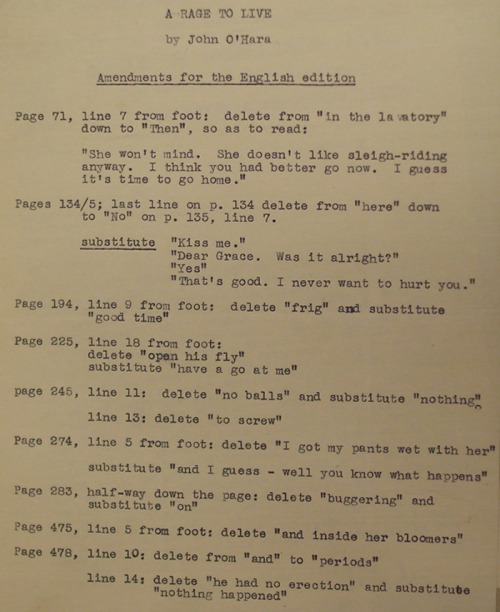The Red-Nosed Man Discourseth!
Welcome to Jason Ensor's personal microblog for unstructured and uncensored thoughts about screen media, culture, text, technology, reading, history, digital humanities, consumption, virtual worlds, literature, futures studies and Australian society. All opinions expressed are solely those of the author and do not represent the views or opinions of any institution or work environment.
Search
Find me on ...

Kinky Edits
It wasn’t that long ago that publishing a book like Fifty Shades of Grey would have landed an Australian publisher in jail due to prevailing obscenity laws and moral panics regarding the content of what people privately read in their own homes. A few years ago, while digitising publisher’s letters in the State Library of New South Wales, I came across this note (the above image) which remains to date one of my favourite finds from the archives. Typed by Denis Cohen in 1950, the letter was a set of suggested amendments for Australian publisher Angus & Robertson to follow if they were to purchase the rights to the rather bawdy novel A Rage to Live by American author John O'Hara and if they were to publish O'Hara’s novel in Australia.
A colleague in the international book trade, along with this note Cohen also sent a copy of the American edition of A Rage to Live to Hector MacQuarrie who at that time was managing director of Angus & Robertson’s London office in the United Kingdom. Sufficiently distant from Australia’s obscenity laws, MacQuarrie could read the book on behalf of Angus & Robertson without threat of prosecution and he eventually advised the home office back in Sydney that: “Without going the slightest bit Presbyterian, my impression, after reading the book, is that it is so utterly bawdy that to amend it suitably, or safely, for your market would be utterly to destroy it. It is, of course, well written; but its whole essence is what might be called bedroom life lived, largely, outside bedrooms. It is quite foul”. Deciding that Cohen’s edits would not be enough, the directors of Angus & Robertson were certain they would go to gaol for six months if the company published A Rage to Live in Australia and so they politely declined the rights.
Such comments and concerns seem quaint by today’s standards but they are indicative of a period in Australian publishing during which the book trade had to navigate values and laws quite at odds with what we think is possible and permissible today. Fifty Shades of Grey, as a book that would have been impossible for Angus & Robertson to publish in Australia during the time of Cohen’s note, has refuelled a long-standing debate pre-dating this era over the question of whether some literature is art or porn. After all, a review of history reminds us that what is considered porn in the previous age can often later be considered culturally valuable in the next age. Any stroll through an art gallery or a look at the list of books once banned in Australia but now freely available will lend evidence to this argument. So, while I’m not in any way suggesting (nor would I) that Fifty Shades of Grey is remotely literary or artistic, the debate it has re-ignited is one worth revisiting since struggles over what messages are free to circulate in society, and challenges over what is literary and what is profane, touch upon issues sensitive to the kind of culture we want to have and encourage in the here and now.
That said, with respect to Fifty Shades of Grey and the desperate stacks of multiple copies that I see fronting most bookstores in Perth, I think there is another important point to be made and it is one best emphasised by acclaimed Australian author Stella Miles Franklin, who in 1946 petitioned on a radio talk that we should all try at least a dozen Australian novels: “You’ll find them better than dozens of others from overseas – piffling stuff by piffling writers whose names I’ve never heard, and which I forget as soon as I’ve glanced through their efforts”. To repurpose the words of Franklin, forget Fifty Shades of Grey: if we want to “take our minds off the washing-up and potato peeling” then “keep on asking for Australian books”!
Sources: Hector MacQuarrie to George Ferguson, Angus & Robertson, 10 January 1950, ML MSS 3269/440; Miles Franklin, 25 January 1946, ML MSS 3269/76.
Notes
thereisaboythatnevergoesout-blog liked this
postscripts-blog posted this